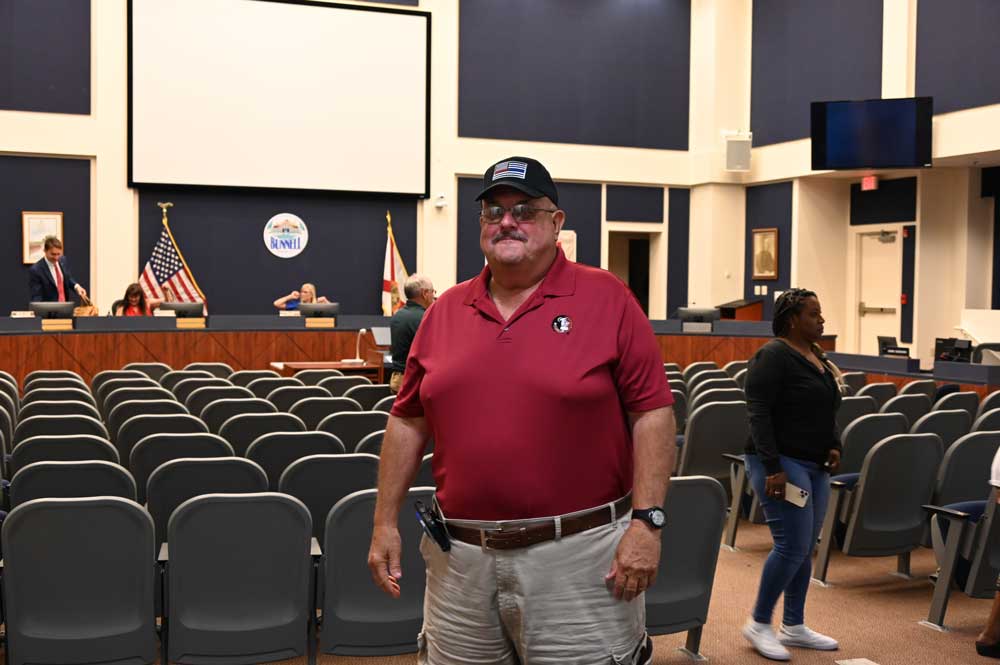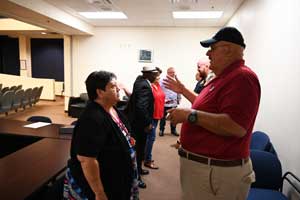
The Bunnell City Commission Monday evening voted 3-1 to appoint Pete Young, who had served one term on the commission between 2006 and 2008, to the seat vacated by the resignation in July of Robert Barnes. It is the sixth time in four years that a seat has turned over on the commission, the third by appointment.
Commissioners John Rogers and Tonya Gordon and Mayor Catherine Robinson voted for the appointment. Commissioner Tina Marie-Schultz was opposed. But Schultz was first to walk up to Young after the meeting, extend a hand, welcome him to the commission, and tell him it was not a vote against him.
She needn’t have explained, as even Young told her. He’d done the very same thing to Daisy Henry in 2006, when Young was a commissioner and he cast the only opposing voice in the 3-1 vote that appointed Henry in place of the late Paul Fell. Young argued at the time that he’d run alongside Henry in the previous election and beaten her, so the commission should not be appointing her.
Monday evening, Young told the commission the very opposite as he made the case for his own appointment. One of the options they should look at, he told them, was appoint the candidate who put in the work, ran, got some votes but lost in the last election–as he did. Another option would be to appoint someone with experience. Again, that meant him, though he also turned to the audience and mentioned his old rival, Henry, who was sitting a few seats back. He also proposed a third option, but said he didn’t agree with it: put applicants’ names in a bucket and draw a name at random. “That would be less headaches and being a commissioner and trying to pick from individual friends of friends and so forth.”
After hearing Young speak, Robinson backed off her support for a November special election.
“Thinking through the process, if we’re going to appoint someone, I do agree that we just recently in March had an election and two people ran, one person did not” win, she said, implying Young but never referring to him by name. “I would bring that one person in to fill the seat until March for them to run again, if that’s what they want to do. That makes sense to me. But they put the effort out. They spent the money, they got the petitions, and they ran.”

Rogers said with such appointments, he favors appointing whoever was in the previous election pool but lost, and said that should be added to the charter. The city’s Charter Review Commission is holding meetings, and is expected to submit that proposed amendment. But Rogers was talking a risk. In this case, he likes Young. He hasn’t always liked candidates who ran and lost, and in future may be forced to appoint them–or find a new rationale not to, though once in the charter, those end-runs are more difficult.The vote followed a discussion among commissioners who considered leaving the seat vacant until March, opening it up to applicants, or holding a special election on the November ballot. Supervisor of Elections Kaiti Lenhart told the city attorney that such an election could be included in the November ballot likely at no cost, as long as the decision was made this week. That last proposal went as far as a motion by Rogers and a second by Gordon, with support from Robinson, but not Schultz (who had polled ahead of Young in last March’s election by 33 votes).
Because of the abbreviated schedule, holding a special election would have made qualification by petition (the candidate would have had to have at least 22 signed petitions) impossible. That meant qualifying would only be possible by paying the $259 qualifying fee (inaccurately confused by some of the commissioners as the $324 fee for the mayor’s position). “It’s hard for people to raise money especially asking your friends,” Schultz said.
“For me even playing field is be able to have the opportunity to go out there, get your ballots for petitions signed, from 18 to 20 people depending on what the number is for that election,” Schultz said. Schultz was also concerned about diverging from the charter. She would have favored opening a 30-day application period, and appointing a candidate from that pool–the way she herself, and Barnes, were originally appointed following the resignations of Bill Baxley and Donnie Nobles. Commissioners did not go that route.
Young was a Florida Highway Patrol traffic homicide investigator until his retirement after a long career with the agency in January. He had also briefly been a deputy with the Flagler County Sheriff’s Office early in his career, after a short stint as Bunnell’s only police officer, and as Bunnell police chief.
Young was not sworn in Monday. That takes place at the commission’s next meeting in two weeks. He will serve out part of Barnes’s term, but will have to run for the special election for that seat in March. The winner of the special election will serve two years, as opposed to the usual three, two years being what would be left on the Barnes term by then.





























Kathryn A. Lopez says
Congratulations Pete Young. You’re back in the saddle again. KAL and Mary Beth
Corn and Taters says
So, now, if the County appoints Rogers to fill the seat vacated by Mullins when DeSantis rids our County of the Carpetbagger then one of the others can have John’s seat and we will all be better off!